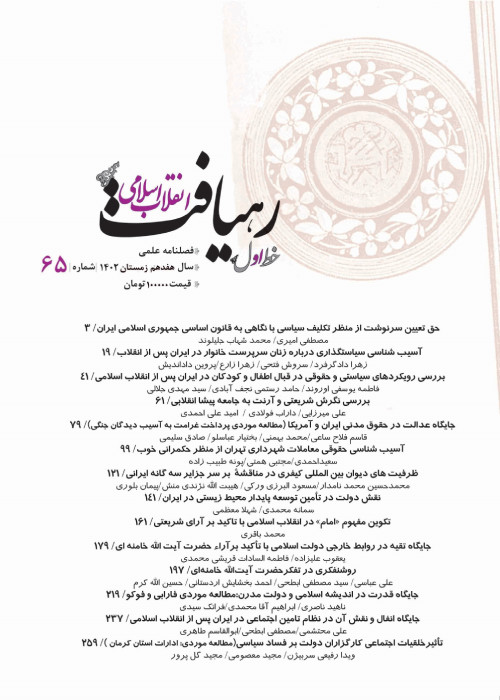فهرست مطالب
فصلنامه رهیافت انقلاب اسلامی
پیاپی 21 (زمستان 1391)
- تاریخ انتشار: 1391/12/15
- تعداد عناوین: 8
-
-
صفحه 148
-
Page 3In this article, the settings of formation of “reformism discourse” and its meaning system during years 1997-2007 are analyzed. Based on analyticaldocumental method, this research shows that in reformism discourse in spite of some positive achievements in the realm of political participation, there has been one dimensional attitude towards political development. Therefore some important aspects such as economic problems, justice and values are ignored. These matters have caused in instability and disorders. In this space, some obstacles have been rise against political development and religious democracy.Keywords: Reformism discourse, Islamic Revolution, construction discourse, political development, freedom, democracy, Mosharekat (Participation) Party, Ayatollah Khamanei, Fundamentalism
-
Page 27This article attempts to analyze the most important causes of American failure in containing Islamic Revolution of Iran and Egyptian Revolution in 2011. The main proposition of this article is that America’s miscalculation and misunderstanding have caused this failure. The results of this article show that American miscalculated about this matter and this problem has caused their failure in the region. This approach of America has caused continuation of problems.Keywords: United Stated foreign policy, Strategic miscalculation, Islamic Revolution of Iran, Egyptian Revolution
-
Page 49In this paper, the dependence on volatile oil revenues as one of the major causes of political instability and uncertainty in policy that affect the development of the country, we have examined, earnings instability cause to instability in government policies and state programs, In addition to, leading the government to achieve development goals failed, and its uncertainty has negatively affected the whole communityIt was not in the foreseeable future conditions and possible long-term planning and infrastructure activities and expected return on investment and reasonable profit in the space of stained dust gone, instead of brokerage activities, early return activity to useful and beneficial activity and the most rational economic activity into the country. It’s not only the goals of the government to development due to changes in government policies and lack of continuity has been failed program greatly, but also prevents private investment, as the engine of development. On the other hand, the same issues continued government dependence on Export oil to community management that unstable, uncertain and finite source.Keywords: political stability, political instability, policy uncertainty, oil dependence, economic development
-
Page 69This article attempts to answer to this question: why in spite of their many similarities, their presence in National Front for 30 years, and their same political orientations, Karim Sanjabi joined the revolution and and Shahpour Bakhtiar supported the Shah? This article, using comparative method, intends to analyze the specific intellectual and behavioral aspects of their personality. This article shows that Ayatollah Khomeini caused differences between these two persons, and therefore National Front could not play its own role.Keywords: Sanjabi, Bakhtiar, political position, Shah's government, Islamic Revolution
-
Page 87Leadership is the most important element in the formation and success of every social movements and no great revolution could be found without leadership during history, although the role of leaders represented differently. This rule is right and applicable in both the Islamic revolution and French revolution. In French revolution some figures such as Mirabou, Danton, and Robespierre appeared as leaders in addition to some intellectuals and Bourgeoisie, but in the Islamic revolution of Iran, Imam Khomaini appeared as the most distinguished charismatic leader without any rival, though some characters such as Dr Shariati, Ayatollah Motahhari, Ayatollah Taleghani and Bazargan shared in the leadership role too. This article inspired by descriptive- analytical approach deploys documentary and library study for data collection and concentrates on the element of leadership of these two revolutions comparatively. Findings show that the leadership in French revolution lacked divinity and charismatic characteristics, while the Islamic revolution directly was inspired by theocratic tenets and charismatic feature. Furthermore French revolution had no specific figure as its leader and its leadership has been accomplished collectively, but the Islamic revolution is known by Imam Khomaini as its sole and the most distinguished leader, who mobilized the oppressed and deprived people under the umbrella of religious doctrines successfully.Keywords: Revolution, Islamic Revolution, French Revolution, Leadership, Iran, Imam Khomaini
-
Page 109International system as a unitary entity with an independent and distinctive identity inserts its own limitations. The distribution of power at international level shapes the structure of international system. Conservative nature of international system has made the change in hierarchy of power difficult. Great powers, that international system is based on them, do not allow any other power to rise in international system. Oil nationalization movement in Iran in Mosaddegh era and nuclear program in Islamic Republic of Iran has faced many structural difficulties. This research attempts to explain and analyze the structure of international system based on these two events.Keywords: International system, structure of international system, power, bipolar system, bi, multi polar system
-
Page 129This article tries to explore a preliminary analytical framework for explaining political economy of oil in post- revolutionary Iran. This analytical tool criticizes some elements of mainstream analytical approach that is called rentier state. The article as its Main founding shows that political variables are as important as economic variables in analyzing oil incomes in Iran’s post- revolutionary era. In this way, we must pay attention to revolutionary nature of political system, mutual relations between state and social groups and elite’s strategies and calculations in spending oil incomes for a better understanding of political economy of oil in postrevolutionary Iran.Keywords: political economy of oil in Iran, effects of oil incomes, theoretical approach of rentier state, economic analytical variables, political analytical variables


